How to Make Instant Pot Short-Grain Rice (Perfect For Sushi)
This easy Instant Pot short-grain rice recipe uses a foolproof pressure cooker method for the best sushi rice. Use the rice as a base for poke bowls, add sushi vinegar to make homemade sushi rolls, or serve warm as a Japanese rice side dish.
Short-grain rice is ubiquitous in Japanese cuisine. A bowl of steamed white rice can accompany most Japanese meals. And my Instant Pot short-grain rice recipe delivers perfect rice in just 30 minutes.
Serve your fluffy rice as a base for poke bowls and rice bowls, as a side dish with your favourite Asian recipes, or to make onigiri (Japanese rice balls). I also include instructions for perfectly seasoned sushi rice with homemade sushi vinegar. It’s great for sushi rolls or sushi bowls!
This Instant Pot sushi rice recipe as written works for Japanese rice (sushi rice) and other short-grain white rice varieties, or medium-grain rice (like Calrose rice). But I include additional cooking instructions for different types of rice in the recipe card.
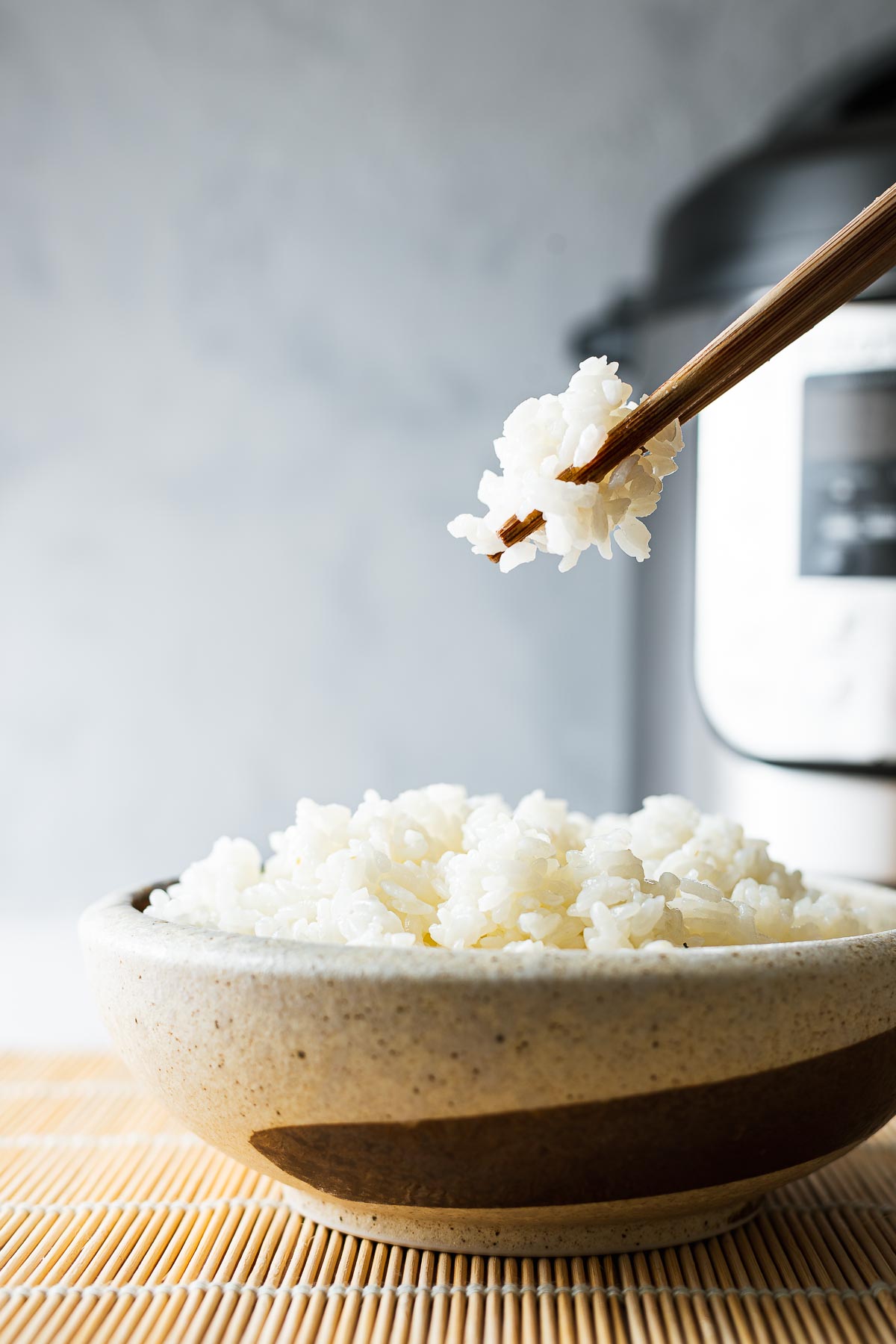
Sushi rice ingredients
Short-grain rice: Look for rice labelled as sushi rice or Japanese short-grain rice. Korean short-grain rice also works, as does medium-grain Calrose rice.
To make perfect short-grain rice with a Instant Pot pressure cooker, you only need rice and water. But if you want to use the rice for homemade sushi, you’ll also need sushi vinegar.
You can use store-bought sushi vinegar, but it is easy to make at home:
- Unseasoned rice vinegar: Use unseasoned rice vinegar to create the perfect balance of savoury, sweet and acidic.
- Sugar: Normal granulated white sugar is all you need, but you can use castor (superfine) sugar to dissolve faster. Or use your preferred sugar alternative.
- Salt
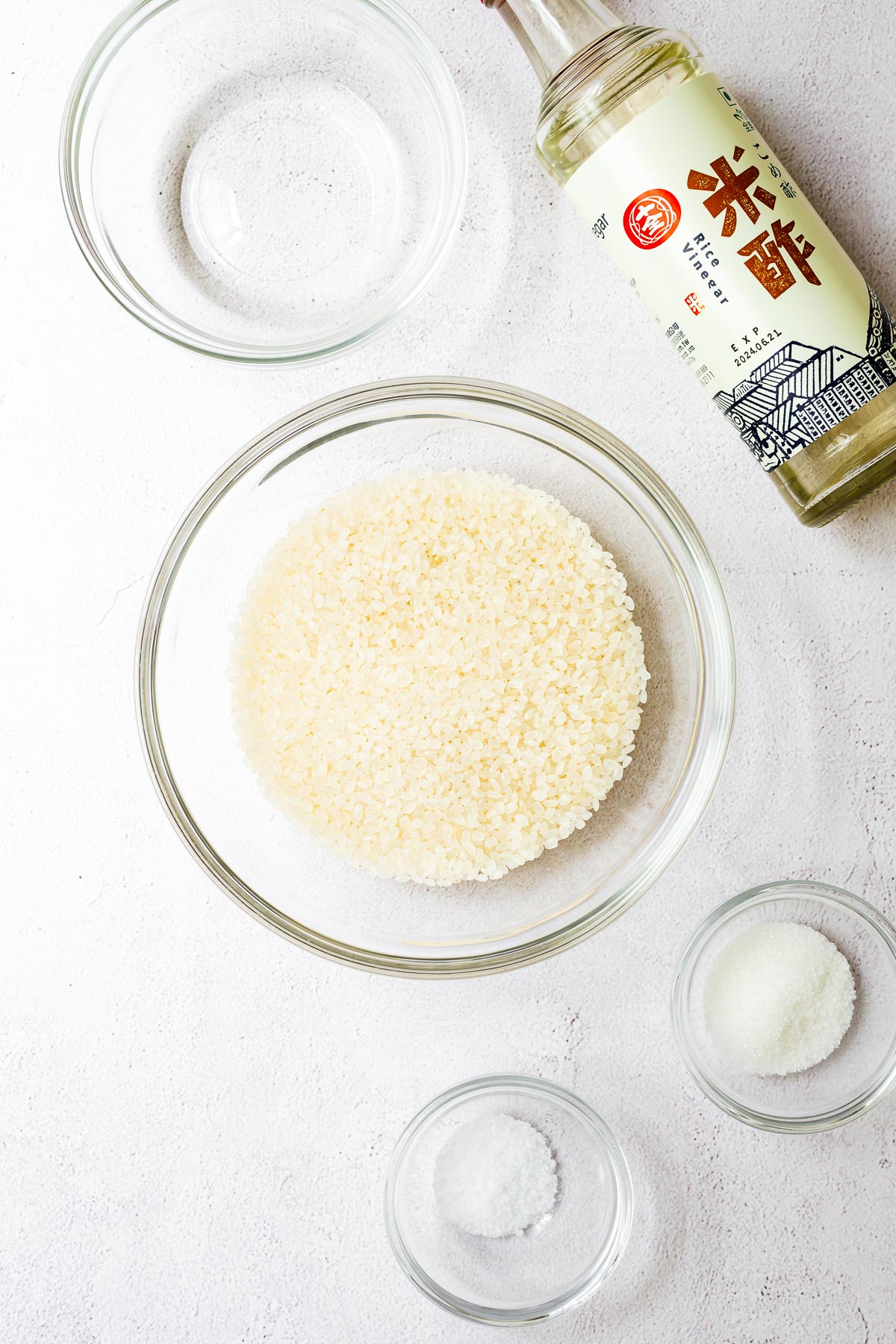
Tips for perfect Instant Pot short-grain rice
The recipe card has step-by-step instructions for washing and cooking sushi rice in an Instant Pot, so I won’t bore you by repeating those details now. But there are a few important steps worth highlighting.
1. Use the right type of rice
Different types of rice require different rice-to-water ratios and different cooking times.
This recipe is specifically for short-grain rice and sushi rice. Try to find Japanese short-grain rice or rice labelled as “sushi rice” (even if it is medium-grain rice). You can also use Korean short-grain rice (mepssal) or Calrose rice in this recipe.
But don’t confuse sushi rice with glutinous rice (mochigome). Mochigome is for mochi rice cakes and glutinous sweets. While it’s also a Japanese short-grain rice, glutinous rice and sushi rice are not interchangeable. Glutinous rice is much stickier and chewier.
The same cooking instructions also work for cooking short-grain brown rice, but you need to use more water and longer cooking time. I include instructions for instant pot brown rice (short-grain) in the recipe card.
If you want to cook long-grain white rice (like jasmine or basmati rice) or long-grain brown rice, use this recipe for Instant Pot long-grain rice instead.
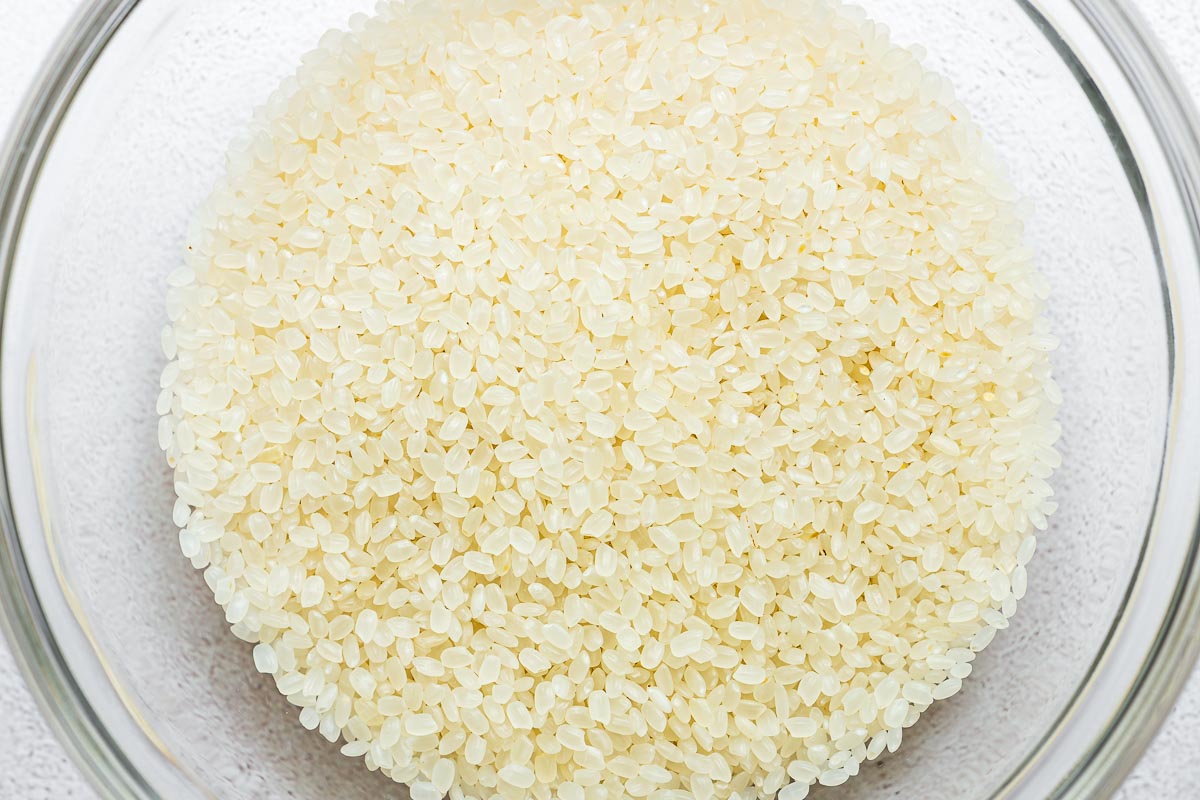
2. Wash rice
Washing the rice removes extra starch and avoids mushy rice.
Place the rice into a large mixing bowl and cover it with cold water. Curl your fingers into a claw shape and gently swirl the rice.
Don’t crush or break the rice.
Pour off the water, and repeat four to five times – until the water starts to run clear. It doesn’t need to be perfectly crystal clear.
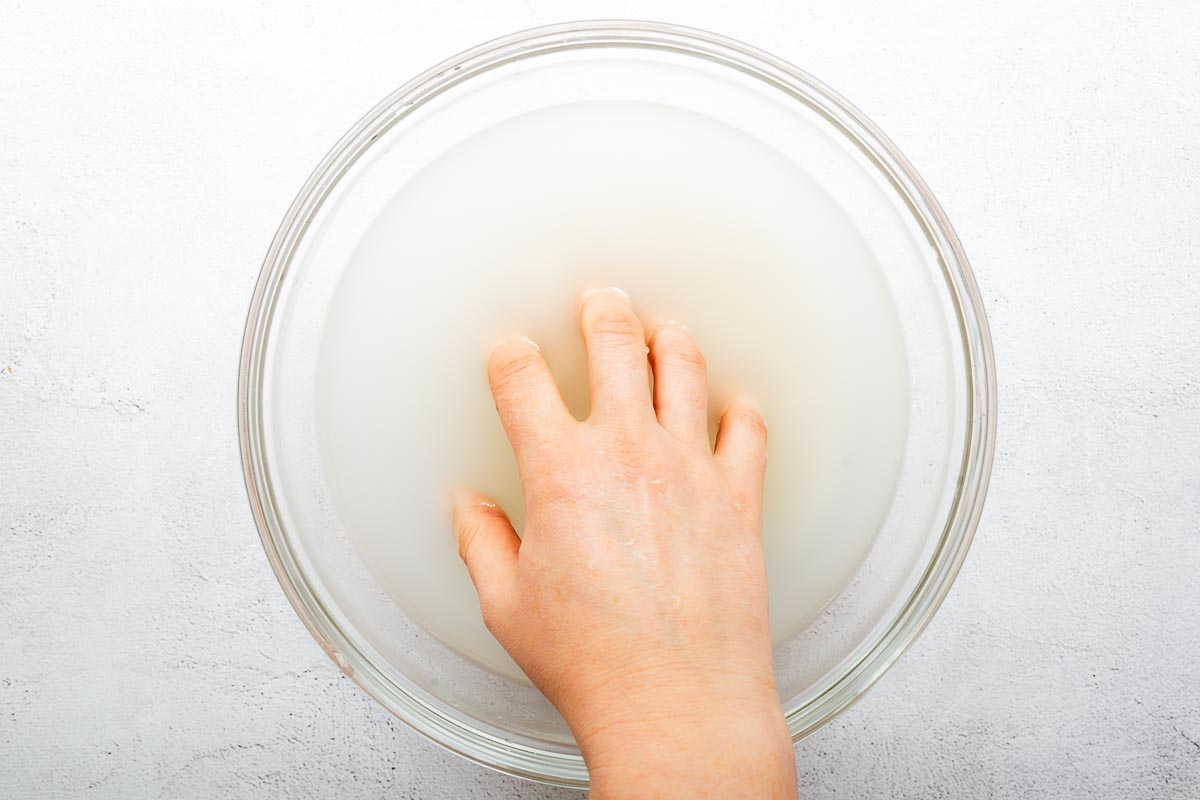
3. Drain rice well
Rice absorbs water very quickly. Too much liquid in the inner pot will lead to watery cooked rice.
Transfer the washed rice to a fine mesh strainer or sieve and leave it to drain for five minutes before adding it to the pressure cooker.
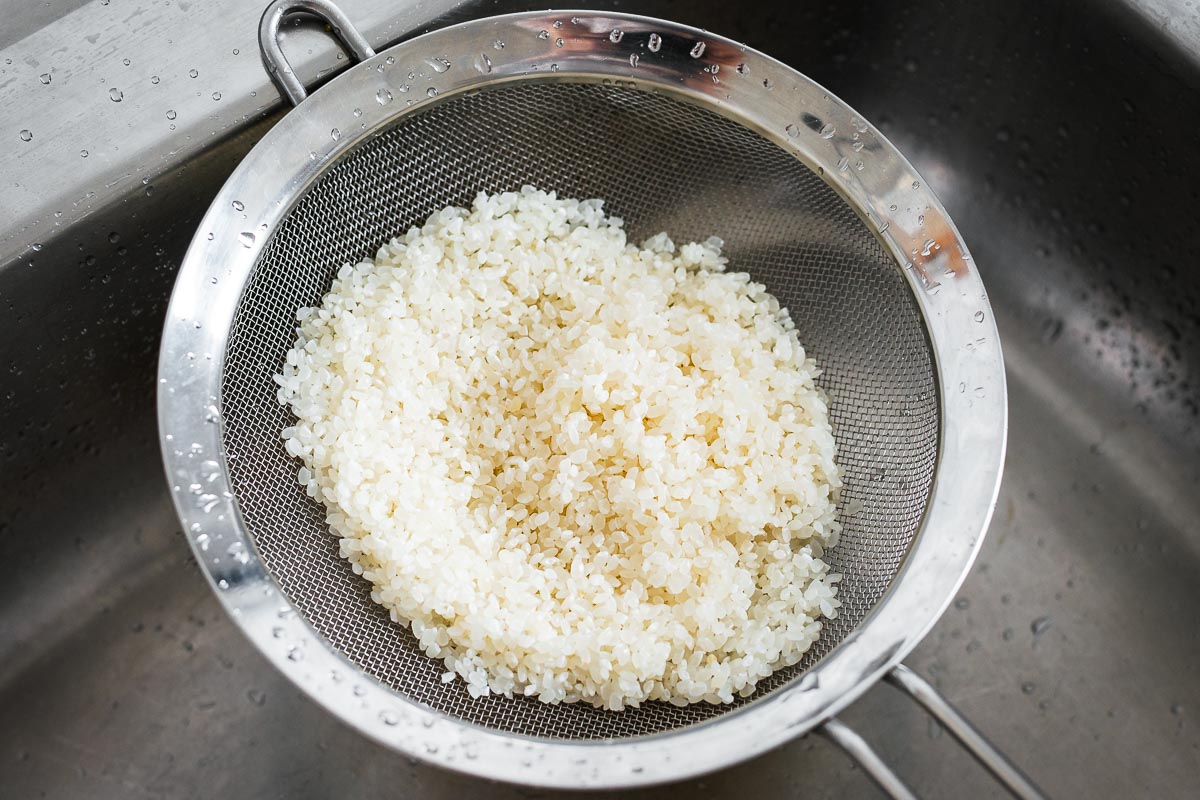
4. Natural pressure release
After a quick five-minute cook, allow the Instant Pot to release pressure naturally for ten minutes. The rice continues to steam during this time.
It is part of the cooking process, so don’t skip it!
Natural release rewards your patience with evenly cooked and fluffy steamed rice.
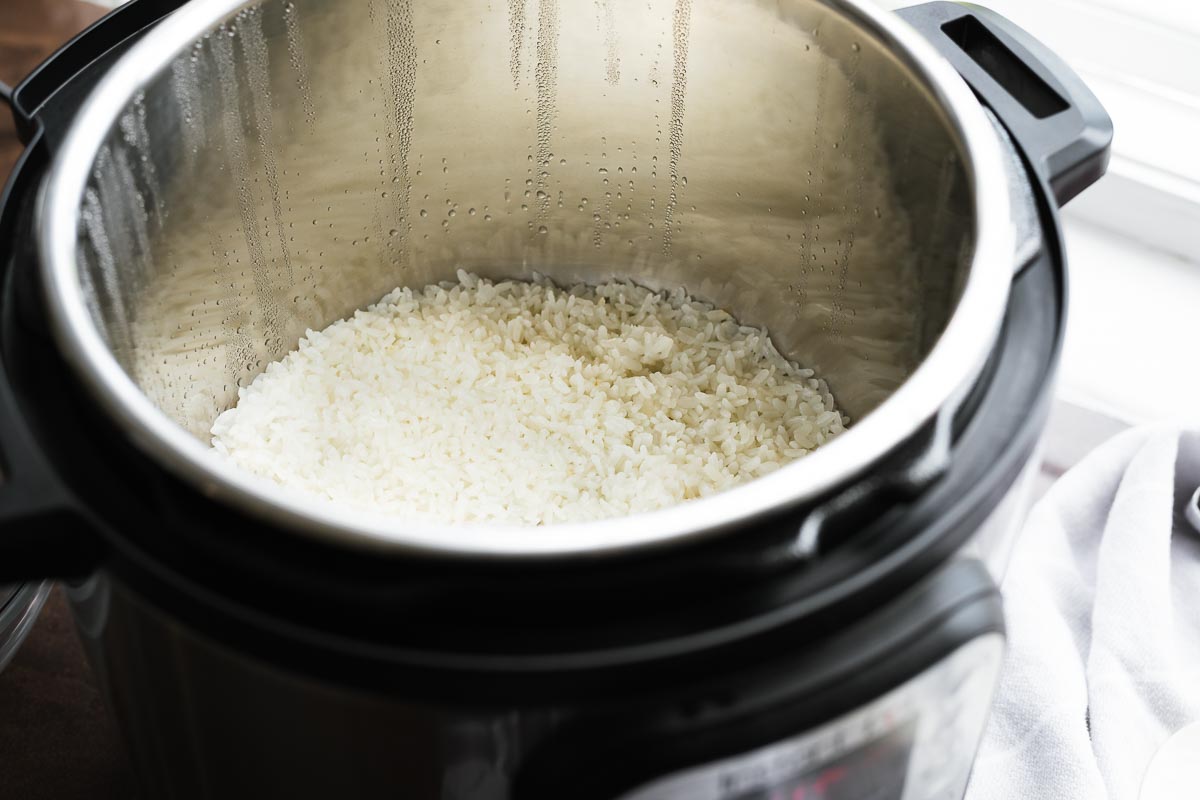
5. Don’t overcook
Remove your cooked rice from the inner pot immediately after the ten minutes of natural pressure release. Otherwise, the residual heat of the Instant Pot causes the rice to overcook, stick to the bottom of the pot and turn mushy.
Even worse, if you forgot to turn off the Instant Pot, it automatically goes into “keep warm” mode guaranteeing overcooked rice.
For sushi: Transfer the rice to a large non-reactive bowl, like a glass bowl and gently stir through the sushi vinegar while the rice is warm using a rice paddle.
For poke bowl: Use a baking sheet covered with parchment paper and spread the rice to cool down before using in poke bowls.
For a warm rice side dish: Fluff the rice with a fork and divide the fluffy rice into serving bowls. Serve the rice warm.
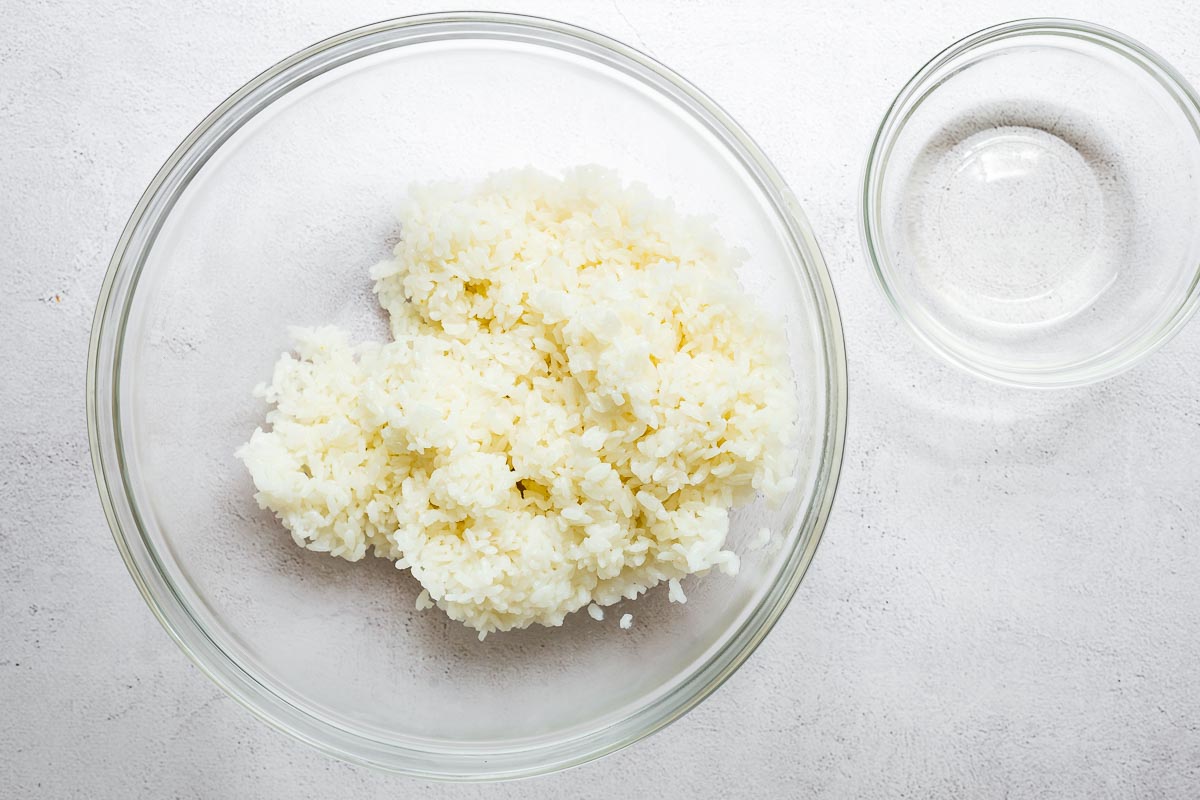
6. Don’t break the rice
Don’t break the rice while you wash uncooked rice or mix cooked rice with the sushi vinegar.
Crushing or breaking the rice kernels leads to mushy rice instead of sticky rice kernels.
When seasoning sushi rice, gently fold the vinegar mixture through the rice in a slicing motion using a rice paddle or wooden spoon, carefully coating each grain of rice with the sushi vinegar. I use the plastic rice paddle that came with my Instant Pot Duo.
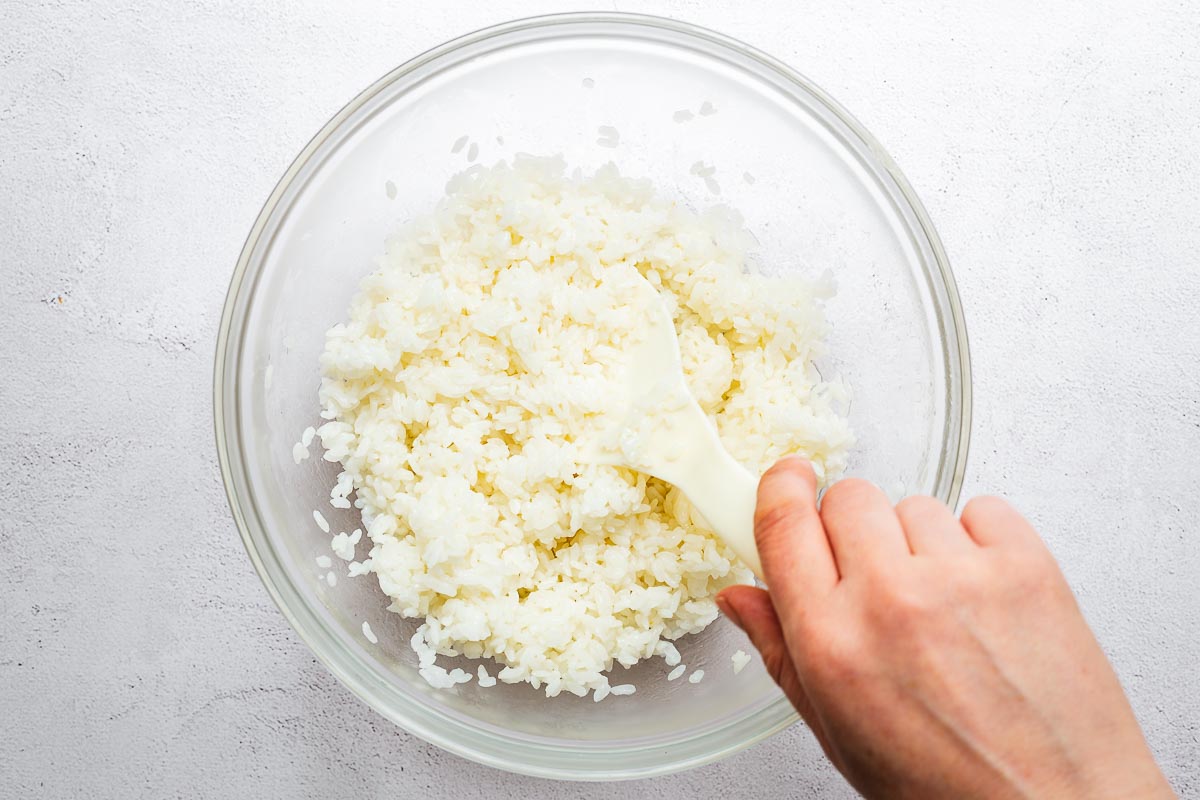
7. Keep the rice moist when cooling
If you want to serve the rice cooled or use it for sushi, you need to cover the rice with a damp tea towel while it cools down to room temperature. Otherwise, the sushi rice will dry out.
Don’t be tempted to speed things up in the fridge. It will dry out and harden your perfectly plump sushi rice. Cooked rice is best used for sushi as soon as it cools to room temperature.
The perfect sushi rice ratios
One of the best things about this Instant Pot rice recipe is that it scales well as long as you keep your ratios correct.
You don’t need to change the washing, cooking or seasoning methods. Simply scale your ingredients and keep the cooking time the same.
Instant Pot short-grain rice to water ratio
Use a 1:1 ratio of uncooked, rinsed rice to water with this no-soak pressure cooker method for white short-grain rice. Brown short-grain rice requires a 1:1.5 ratio of rice to water.
So for every cup of washed, unsoaked short-grain white rice, add one cup of water. Or for every cup of washed, unsoaked short-grain brown rice, add a cup and a half.
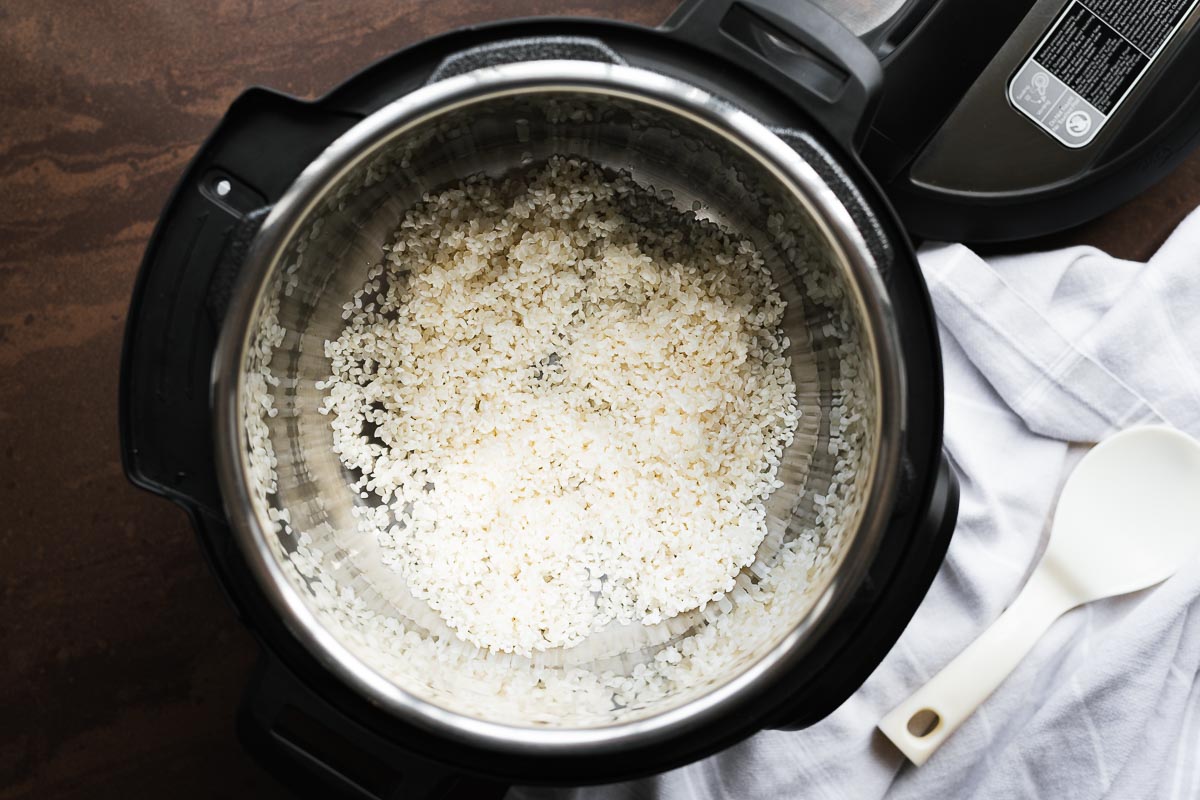
Sushi vinegar ratios
I use a 6:3:1 ratio of unseasoned rice vinegar to sugar to salt for my sushi vinegar mixture.
For each teaspoon of salt, use three times the amount of sugar and six times the amount of vinegar.
Sushi vinegar to uncooked rice ratio
I was childishly disappointed when I ordered sushi in a generic seafood restaurant and received sushi rolls that tasted overwhelmingly of vinegar. Maybe they ran out of rice vinegar? Perhaps they just used too much? But whatever the reason, I am forever fearful of overseasoning sushi rice.
Luckily, I have my vinegar to rice ratio dialled in perfectly to suit my palate.
I use two tablespoons of rice vinegar (and a tablespoon of sugar and a teaspoon of salt) for each US cup of uncooked rice (or two heaped cups of cooked sushi rice). Or use three tablespoons of shop-bought sushi rice vinegar.
Tip: If you want to find your perfect ratio of vinegar to rice, make a large batch of the sushi vinegar mixture – it keeps well in the fridge. Add two tablespoons of vinegar to your cooked rice. Taste, and mix in more vinegar until you’re happy with the result.
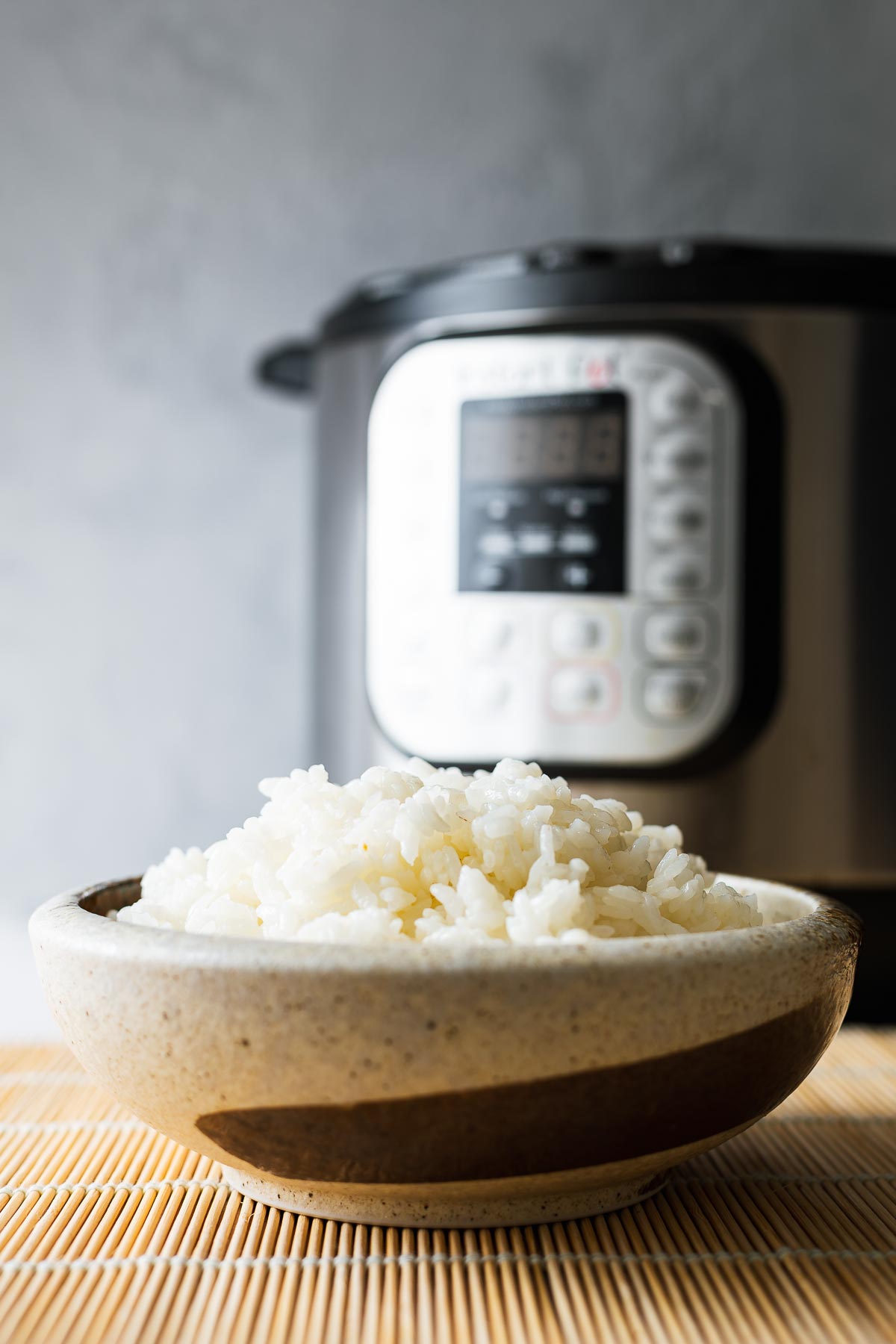
Frequently asked questions
White sushi rice requires a 1:1 ratio of rice to water. This means that for every cup of uncooked rice, you add a cup of water.
The ratio of rice to water depends on the type of rice used. White rice requires a 1:1 rice-to-water ratio. Brown short-grain rice requires 1:1.5, brown long-grain rice requires 1:1.75, and wild rice requires a 1:2 rice-to-water ratio.
Serving suggestions
Use steamed white rice for onigiri or poke bowls. Or serve it with your favourite Asian dishes:
- Breakfast: Try steamed rice with Japanese-style miso scrambled eggs or use it in Korean egg rice bowls.
- Light meal: Serve the rice with nasu dengaku (Japanese miso eggplant).
- Dinner: Asian stews like this Gochujang tofu (spicy Korean braised tofu) dish or stir-fries like Chinese tomato egg stir-fry are all delicious with rice.
- Side dish: Simply sprinkle the warm rice with sesame seeds and serve alongside your favourite recipes.
- Leftover rice: Perfect for fried rice! Try Korean fried rice with gochujang and kimchi.
Or, use your vinegared sushi rice in homemade sushi:
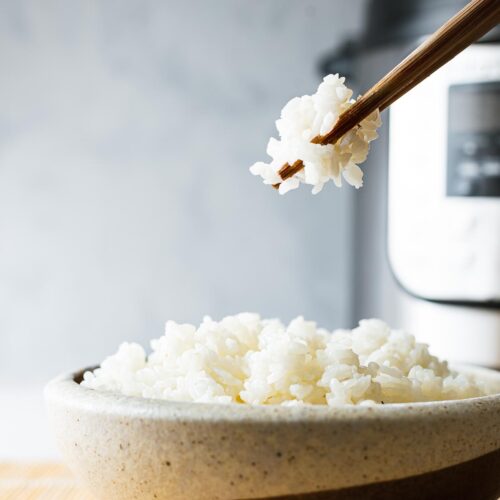
Equipment
- Large glass bowl – or wooden hangiri bowl
- Instant Pot – or electric pressure cooker
- Rice paddle or non-metal spatula
Ingredients
- 1 cup sushi rice*
- 1 cup water
Sushi vinegar ingredients (for sushi rice)
- 2 tablespoons unseasoned rice vinegar
- 1 tablespoon sugar
- 1 teaspoon ground sea salt
Instructions
Rinse the rice
- Place the rice in a large mixing bowl and cover it with cold water. Gently swirl the rice with your fingers shaped in a claw. Pour off the water, and repeat 4 to 5 times – until the water runs clear.
- Transfer the rice to a fine mesh strainer and leave it to drain for 5 to 10 minutes.
Cook the rice in Instant Pot (or similar pressure cooker)
- Add 1 cup of rinsed rice and 1 cup of water to the inner pot.
- Lock the lid and move the steam release valve to the sealing position. Set the Instant Pot to pressure cook mode (or manual mode for older models) on high pressure for 5 minutes.
Mix the sushi vinegar (only if making sushi)
- While the rice cooks, make the sushi vinegar. Place the rice vinegar, sugar and salt in a small bowl and stir until dissolved.
- You can gently heat the vinegar mix in a microwave for 30 seconds to help the sugar dissolve. Or use a small saucepan. But don’t allow the vinegar to boil.
Natural pressure release
- After the 5-minute cook time, allow 10 minutes of natural release before turning the steam release valve to the venting position for quick release. Fluff the rice with a fork before serving your steamed short-grain rice.
Season the rice for sushi (optional)
- To use the steamed rice for sushi, immediately transfer the cooked rice to a large wooden or glass mixing bowl.
- Add the seasoned vinegar mix. Gently fold it through the rice with a rice paddle in a slicing motion to combine, carefully coating each grain of rice with the mixture.
- Cover the rice with a clean damp kitchen towel and allow it to cool to room temperature before using it for sushi – about 30 minutes.
Notes
- Different types of rice may require a different ratio of rice to water. This recipe works perfectly for any white short-grain rice, like Japanese rice (sushi rice), and medium-grain Calrose rice.
- For brown short-grain rice, use a rice-to-water ratio of 1:1.5 – add 1½ cups water for every cup rice. And increase the pressure cooking time to 20 minutes.
- And, for long-grain rice (like jasmine rice and basmati rice), see how to cook long-grain rice in the Instant Pot.
- See this easy stovetop sushi rice recipe if you want to free up the Instant Pot.
- Refrigerate leftover rice in an airtight container for up to 3 days. Reheat it thoroughly before serving.
- See more sushi rice tips in the full post for the best Instant Pot sushi rice.
- And, for stovetop sushi rice instructions, see this easy stovetop sushi rice recipe.
